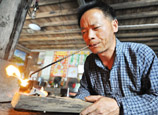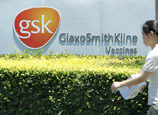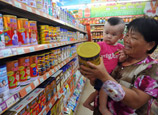
PLASTIC film used by supermarkets to wrap meat and vegetables may contain banned toxic plasticizers that could impair male sexual function and lead to premature sexual development in females, according to China Central Television.
Fifteen samples of polyvinyl chloride plastic wrap out of 16 samples sent for tests were found to contain bis(2-ethylhexyl) adipate (DEHA), some at an alarming level, CCTV said.
The plastic film was from produce bought in Shanghai, Beijing and Guangzhou, but CCTV did not name the brands or the supermarkets involved.
The presence of DEHA can only be determined when it reaches 0.05 percent, and the highest content of DEHA in the samples was 472 times that level, CCTV said.
The General Administration of Quality Supervision, Inspection and Quarantine issued a circular banning the use of DEHA in plastic wrap in 2005. "DEHA could lead to the disorder of endocrine system, impair male sexual function and cause female sexual precocity, and pose big risks to the genital development of infants," said Dong Jinshi, vice president of the International Food Packaging Association.
Dong said the banned substance can leak out and penetrate into food more easily when the plastic wrap is used for foods with a high level of fat.
CCTV reporters visited the Tongxiang Chemical Co Ltd in Zhejiang Province, which supplies raw materials to companies such as the Wuxi Xindi Plastic Products Co and Shanghai Junshi Plastic Products Co. Tongxiang claimed its materials only contained dioctyl adipate (DOA), which is permitted under Chinese standards.
However, CCTV said DEHA was found in its sample products sent for tests.
The cost of raw materials for plastic wrap containing DEHA is 8,000 yuan (US$929) per ton compared with 12,000 yuan for plastic wraps containing DOA.
CCTV said Xu Xiaofeng, a business manager at the Tongxiang company, admitted it used DEHA as a raw material for plastic wrap due to its lower cost.
CCTV said polyvinyl chloride (PVC) plastic wrap accounts for about 70 percent of the market due to its lower cost compared with polyethylene (PE), and it is widely used at supermarkets to wrap vegetables, fruits and meat.
Experts said consumers should avoid buying PVC plastic wrap for domestic use and use the PE variety.
At the Hualian chain store on Dagu Road in Shanghai, one customer said she had heard about the problem. Although she had no idea how to tell PVC from PE, she said she took care when using plastic wrap.
"I neither put it in the microwave or use it to wrap meat or anything with oil," she said.
















 3 killed, 5 injured in S China knife attack
3 killed, 5 injured in S China knife attack


![]()
